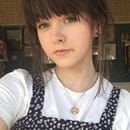I recently found myself listening to the podcast ‘My Life in Books’ and wondering, if I were someone one of Britain’s favourite authors and invited on to the show, what books would I talk about? Picking only four books wasn’t easy, though I ended up choosing books I either come back to most frequently or that have influenced my own writing.
1. The Gashlycrumb Tinies by Edward Gorey
‘Y is for Yorick whose head was bashed in. Z is for Zillah who drank too much gin.’
– Edward Gorey, The Gashlycrumb Tinies.
A brief honourable mention to one of my favourite children’s books, The Gashlycrumb Tinies. The book has a simple yet gruesome premise, introducing 26 characters in an abecedarium fashion, we are told of their deaths through comical rhyming couplets. Think Dr Seuss meets Norman Bates. The book’s monochrome, gothic illustrations are what initially drew me to this book as a child. Although unaware of its dormant influence, reflecting on it today, the gothic imagery is very similar to the modern gothic authors that I enjoy most like Helen Oyeyemi and Oyinkan Braithwaite.
2. Poems of Emily Berry
‘My mother is dead – it’s classic.
It means I’m both precocious and heartbroken,
but that’s no excuse for bad manners.’
– Emily Berry, Manners.
Berry’s poetry first came to me through Twitter the morning following the 2017 general election. The poem, Bad New Government seems to have resurfaced on Twitter after nearly any political event over the last three years. Upon reading Bad New Government for the first time, it felt like a little bit of magic amid my heartbreak over the election results. The poem ends with the line:
‘I am writing my first political poem
Which is also (always) about my love for you’
Both of Berry’s poetry collections discuss relationships. Whether it be the loss of her mother which is central to many of the poems in Stranger Baby, or romantic relationships, she tackles both with a unique and witty casualness. When it comes to poetry, I look for a mix of the nonsensical and the melodrama of romance which is something that Berry conveys beautifully.
3. Everything I Know About Love by Dolly Alderton
‘Love is a quiet, reassuring, relaxing, pottering, pedantic, harmonious hum of a thing; something you can easily forget is there, even though its palms are outstretched beneath you in case you fall.’
– Dolly Alderton, Everything I Know About Love.
I know that everyone and their dog has read this book by now but I’m including it anyway! Everything I Know About Love is an incredibly nostalgic memoir which is almost impossible to put down. I initially expected it to be exclusively about Alderton’s love life, since she was a renowned dating columnist for The Sunday Times’ before the book’s publication. Alderton instead takes a unique approach to the topic of love by primarily discussing her female friendships and how those relationships have shaped her as a person. Everyone I know who’s read this book seems to agree that it made them reevaluate how essential strong friendships are between women.
4. We Have Always Lived in the Castle by Shirley Jackson
‘I was pretending that I did not speak their language; on the moon we spoke a soft, liquid tongue, and sang in the starlight, looking down on the dead dried world.’
– Shirley Jackson, We Have Always Lived in the Castle.
Shirley Jackson was a name I’d heard many times but never really paid attention to until I found battered secondhand copy and decided to give We Have Always Lived in the Castle a shot. Though I’ve only read it recently it is quickly becoming one of my all-time favourite novels. I adore that at the heart of such an eerie novel there is such a strong juxtaposition between fear and the unbreakable loyalties between the two main characters, sisters Constance and Merricat. Jackson’s ability to create such uncanny characters is perhaps my favourite aspect of the book. The characters are full of contradiction, discrepancy yet simultaneously, unity. We Have Always Lived in the Castle is a masterclass in character building and a must-read for anyone who wants to improve on their own fiction writing.



